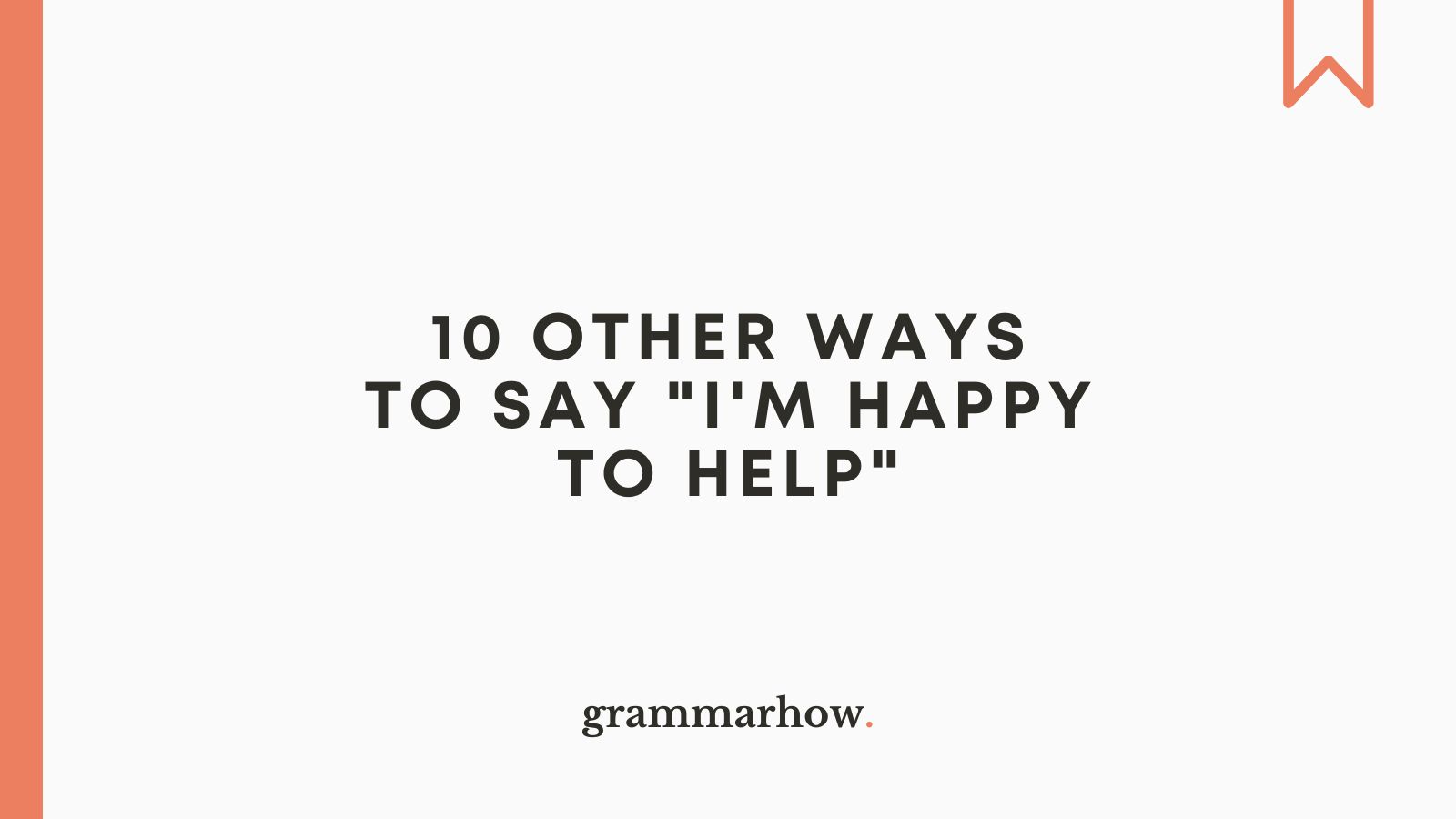When you want to show someone you’re ready to help, saying “Happy to assist” is common—but what if you had fresh, friendly ways to express it? Using different phrases can make your message feel more personal and engaging.
Whether you’re writing emails, chatting with clients, or talking to friends, finding the right words can make a big difference. You’ll discover simple and effective alternatives that will help you connect better and sound more confident every time you offer your support.
Keep reading to unlock new ways to say “Happy to assist” that fit your style perfectly.

Credit: lexoqust.com
Polite Alternatives To Happy To Assist
Finding polite ways to say “Happy to Assist” can improve your communication. It shows respect and friendliness in different situations. Using varied phrases keeps conversations fresh and professional. You can choose expressions that fit formal or casual settings. This helps you connect better with others and sound more natural.
Common Phrases To Use
Simple and polite phrases work well in most cases. Try saying “Glad to help” or “At your service.” “I’m here to help” sounds warm and inviting. “Feel free to ask” encourages open communication. These phrases are easy to understand and use daily.
Formal Expressions
In formal settings, choose respectful and clear phrases. “It is my pleasure to assist you” sounds professional. “I am happy to be of service” adds politeness. “Please let me know how I may assist” is courteous. These expressions fit emails and business talks well.
Casual Variations
Casual language creates a friendly, relaxed tone. Say “No problem, happy to help” for a light feel. “Just let me know what you need” works well. “I’m here if you need anything” is easygoing. These phrases suit chats with friends or coworkers.

Credit: smartraply.com
Context-based Choices
Choosing the right phrase depends on the situation. Saying “happy to assist” sounds polite and helpful. But sometimes, other words fit better. Different settings call for different tones and styles. Picking the right phrase shows respect and clarity. It makes communication smoother and friendlier.
Customer Service Situations
In customer service, kindness matters a lot. Phrases like “glad to help” or “pleased to support” work well. They sound warm and welcoming. Short and clear words build trust. Customers feel valued and heard. Avoid phrases that sound too formal or stiff.
Professional Emails
Email language should be polite and clear. Try “at your service” or “ready to assist.” These phrases keep a professional tone. They show willingness without sounding casual. Use simple words to avoid confusion. This helps build good business relationships.
Informal Conversations
Talk with friends or close colleagues is relaxed. You can say “happy to help” or “here to help.” These sound friendly and casual. They make the conversation feel easy and natural. Avoid formal words to keep the mood light and open.
Tone And Nuance
The tone and nuance of a phrase can change its meaning and impact. Saying “Happy to assist” sounds polite and helpful. But there are many ways to say it that express different feelings. Choosing the right words helps match the situation and your audience. It shows respect and care.
Simple changes in tone make your message clearer. You can sound eager, formal, or friendly. Each style suits different moments. Knowing these differences improves communication. It helps others feel understood and valued.
Expressing Willingness
Words like “Glad to help” or “At your service” show readiness. They tell the listener you want to assist. These phrases invite questions or requests. They make people feel welcome to ask for help. Use them to create a warm and open atmosphere.
Showing Enthusiasm
Phrases such as “Excited to help” or “Looking forward to assisting” express energy. They show you enjoy helping others. This tone can boost morale and trust. Use it when you want to inspire confidence and positivity. It makes the interaction lively and upbeat.
Maintaining Professionalism
Say “I am here to assist” or “Please let me know how I can help” for a formal tone. These phrases are respectful and clear. They fit well in emails and business talks. This style keeps the message polite but serious. It builds trust and shows you value professionalism.
Cultural Considerations
Understanding cultural differences is key to communicating politely. Saying “happy to assist” varies across cultures and regions. What feels natural in one place may seem unusual in another. Respect for local customs makes your message clear and kind. This section explores how culture influences polite expressions.
Regional Differences
Different regions have unique ways to express willingness to help. In the United States, “happy to assist” is common and polite. In the UK, people may say “glad to help” or “at your service.” Some Asian cultures prefer more formal phrases like “I am honored to assist you.”
Simple phrases might not fit all cultures. In Latin America, warmth and friendliness are key. Saying “I am here to help” shows care and respect. In some Middle Eastern countries, offering help often includes polite blessings.
International Communication Tips
Keep your language clear and simple for global audiences. Avoid idioms and slang that confuse non-native speakers. Use short sentences and basic words. This helps everyone understand your intent easily.
Consider cultural norms about formality. Some cultures value formal language more than others. Adjust your tone to match your audience’s expectations. Showing respect through language builds trust and rapport.
Examples In Sentences
Using different ways to say “happy to assist” adds variety to your communication. It keeps your messages fresh and polite. Below are examples showing how to use alternative phrases in different settings. These examples help you speak clearly and kindly.
Email Responses
Thank you for reaching out. I am glad to help with your request.
Please let me know if I can support you further.
I’m available to assist you anytime with this matter.
Phone Conversations
It’s my pleasure to help you today.
I’m here to support you with any questions.
Feel free to ask; I’m ready to assist.
Face-to-face Interactions
I’m happy to be of service.
Let me know how I can help you.
I’m here to assist with whatever you need.

Credit: grammarhow.com
Avoiding Overused Phrases
Using the phrase “Happy to assist” often feels polite but can sound dull. Overused phrases lose their impact quickly. They may make your message seem less genuine. Choosing fresh words keeps your communication lively and engaging. It helps build better connections with readers or customers.
Refreshing Your Language
Try swapping “Happy to assist” with new expressions. Small changes make a big difference. Saying “Glad to help” or “Pleased to support” adds warmth. These alternatives sound friendly and sincere. Changing your tone shows you care about your audience. It keeps your writing interesting and easy to read.
Creative Alternatives
Use creative phrases to stand out. “At your service” gives a professional yet kind touch. “Ready to lend a hand” feels approachable. “Here to support you” sounds caring and clear. These choices avoid repetition and add personality. They invite trust and encourage interaction.
Frequently Asked Questions
What Are Common Alternatives To Say “happy To Assist”?
Common alternatives include “Glad to help,” “At your service,” and “Pleased to support. ” These phrases express willingness to assist politely and professionally.
How To Say “happy To Assist” In A Formal Way?
Use phrases like “I am here to help,” “Delighted to be of service,” or “It’s my pleasure to assist you” for a formal tone.
Can I Use Synonyms For “happy To Assist” In Emails?
Yes, using synonyms like “Glad to assist” or “Always ready to help” adds variety and keeps communication engaging in emails.
Why Use Different Phrases Instead Of “happy To Assist”?
Using varied phrases prevents repetition, makes communication lively, and enhances professionalism in customer service or workplace interactions.
Conclusion
Finding different ways to say “happy to assist” adds variety to your conversations. It shows kindness and willingness to help. Using simple phrases makes communication clear and friendly. Practice these alternatives in your daily talks. They help build better connections and trust.
Always speak with a positive tone. Helping others feels good and spreads goodwill. Keep your language easy and warm. Small changes make a big difference in how you sound. Try these phrases and notice the impact. Your words can brighten someone’s day.
